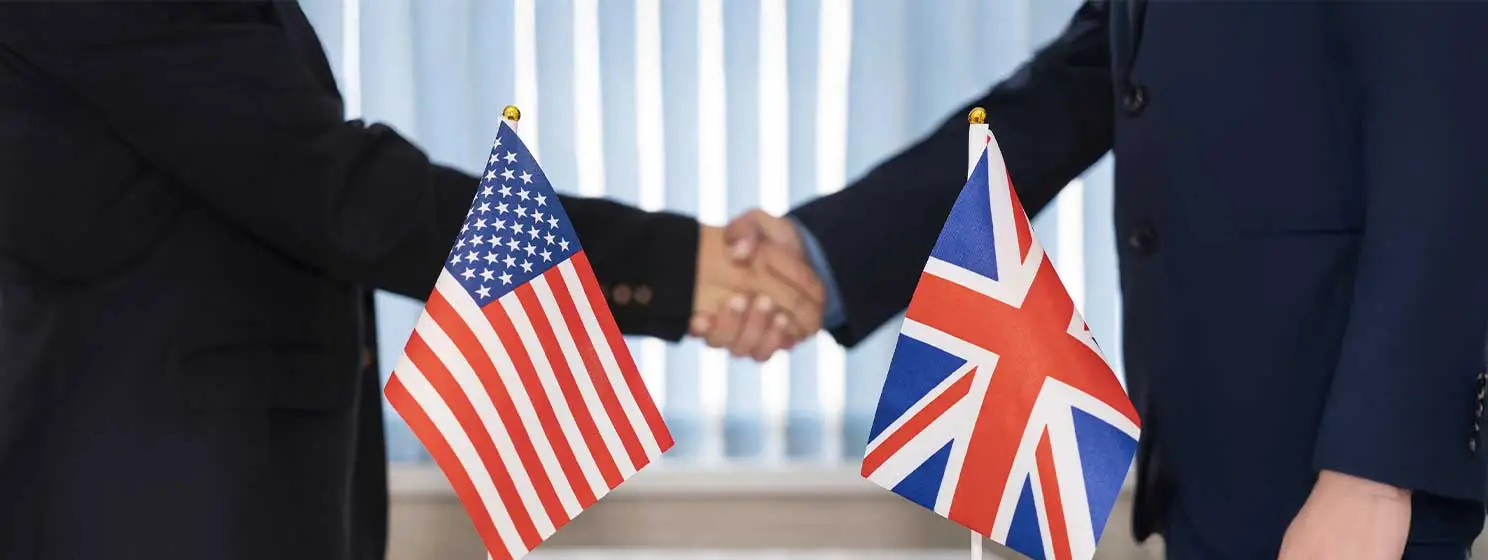|
Getting your Trinity Audio player ready...
|
Several United Kingdom trade groups have urged the country’s government to include blockchain technology in a planned technology cooperation deal with the United States, known as “Tech Bridge.”
According to a September 12 report from Bloomberg, a dozen industry lobby groups representing the finance, technology, and digital asset sectors sent a letter to the British Business Secretary Peter Kyle and Economic Secretary to the Treasury Lucy Rigby, arguing that distributed ledger technology (DLT) should be a “core strand” of the proposed “U.K.-U.S. Tech Bridge.”
The industry push comes ahead of U.S. President Donald Trump making a state visit to the U.K. on September 16, where he will reportedly be accompanied by senior U.S. tech executives, including OpenAI’s Sam Altman and Nvidia’s (NASDAQ: NVDA) Jensen Huang.
The Financial Times reported last week that during Trump’s three-day visit, the U.K. government was hoping to sign a memorandum of understanding (MoU) with Washington on a technology deal that would see the two countries create “complementary partnerships” across artificial intelligence (AI), quantum computing, defense innovation, and civil nuclear energy—the latter to power advanced computing economies.
A September 11 letter from the UK Cryptoasset Business Council, U.K. Finance, TheCityUK, and The Payment Association, among other groups, argued that blockchain should be part of this partnership.
“Excluding digital assets from the UK-U.S. Tech Bridge would be a missed opportunity,” wrote the groups. “It risks leaving Britain on the sidelines while others — particularly in the Middle East and Asia — move ahead in setting the standards that will shape the future of finance.”
The letter went on to emphasize the importance of DLT, the foundation technology of blockchain, stating that it “represents a technological transformation” and that “alongside other emerging technologies, it is driving the next generation of financial services and infrastructure – improving capital flows, facilitating faster and cheaper payments, driving efficiencies and productivity, and widening financial inclusion.”
In terms of specific blockchain technologies, the lobby groups highlighted stablecoins and tokenization as “strategically relevant and important sectors” for both the U.S. and U.K.
The groups also warned that without coordinated action, U.K. firms acting in these sectors “could face fragmented regulatory environments, reduced access to deep transatlantic markets, and increasing competitive pressures.”In response to the letter, a government spokesperson reportedly told Bloomberg that the U.K. and the U.S. were natural partners and had already partnered on essential technologies such as AI, quantum, and cybersecurity. However, they declined to comment on the announcement of any possible new initiatives.
Transatlantic crypto hubs
The U.K. made its blockchain ambitions clear under former Prime Minister Rishi Sunak, who announced in 2022 his desire to make the U.K. a “crypto hub.”
While the party in charge may have since changed, the motivation appears to remain the same. In April, Chancellor of the Exchequer Rachel Reeves published a draft digital asset regulation and indicated that the government planned to work with the U.S. to support innovation across the digital asset industry.
“Through our Plan for Change, we are making Britain the best place in the world to innovate — and the safest place for consumers,” said Reeves, in an April 29 statement, adding that the U.K. and U.S. would “continue engagement to support the use and responsible growth of digital assets.”
If the U.K. is indeed committed to following a U.S.-style approach to the digital asset space, then a wholesale embracing of the sector is on the cards.
Since his inauguration in January, President Trump has followed through on his many promises to make the U.S. the “crypto capital of the world,” including creating a strategic bitcoin reserve, encouraging progress on stablecoin legislation,
reversing so-called “crypto de-banking,” and generally reshaping the regulatory landscape of the U.S. into a friendlier environment for digital assets.
If the U.K. is to compete, or cooperate with the U.S. in the digital asset space, then its impending regulation will likely need to reflect the current mood across the pond.
Watch: Future-proof data governance with Pieter Den Dooven

 02-17-2026
02-17-2026 




